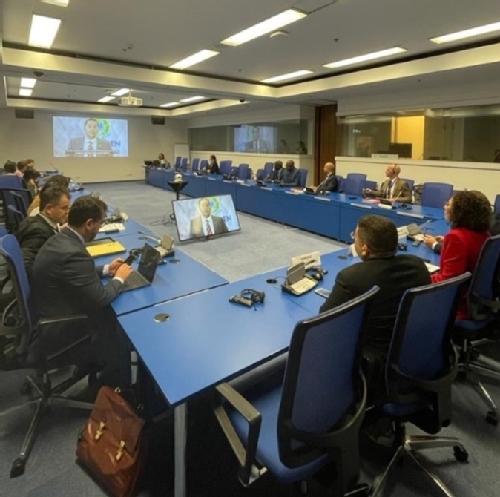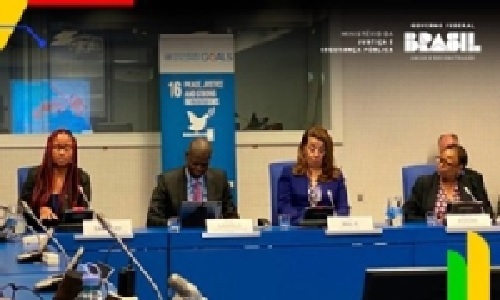
From 22 to 26 May 2023, the United Nations Office on Drugs and Crime (UNODC) headquarters in Vienna, Austria, hosted the 32nd session of the Commission on Crime Prevention and Criminal Justice (CCPCJ). Over 1,800 participants from 136 Member States, 18 intergovernmental organizations, 69 non-governmental organizations, and several United Nations (UN) entities gathered for this year's event. The 2023 CCPJC featured the thematic discussion "Improving the functioning of the criminal justice system to ensure access to justice and realize a safe and secure society", and participants stressed the need for the criminal justice system to be victim centered.
Accompanied by officials from UNODC Brazil, the Brazilian delegation at the CCPCJ included representatives from the National Secretariat of Justice (SENAJUS/MJSP), the National Secretariat of Drug Policy (SENAD/MJSP), the National Secretariat of Penal Policy (SENAPPEN/MJSP), the Secretariat of Penitentiary Administration of the State of Maranhao (SEAP-MA), the Secretariat of Labor Inspection of the Ministry of Labor and Employment (SIT/MTE), the Labor Prosecutions Office (MPT), and the Federal University of Minas Gerais (UFMG).
On 24 May, under the framework of the PRIS-COOP project, a partnership between UNODC Brazil and prison administrations at federal and state level, the side event "Promising Practices in Prison Management aimed at Social Reinsertion and Reduction of Recidivism in Brazil" was organized with the objective of presenting the priorities of the recently created National Secretariat for Penal Policies (SENAPPEN) in prison management, with a focus on rehabilitation, as well as presenting positive Brazilian experiences on the subject.

The Secretary of Penitentiary Administration of Maranhao presented the positive changes occurred in prison management, including the classification model that contributed to increase security and work and education opportunities in prison, while the representative of the National Council of Justice (CNJ) shared the policy of biometrics and civil identification of prisoners to ensure access to services and programs in prison.
Later in the week, the National Programme for Public Security with Citizenship (PRONASCI), created by the Ministry of Justice and Public Security (MJSP), participated in the event "Equal Access to Justice for All: Achieving inclusive, accountable and people-centered criminal justice", which was attended by the Executive Director of UNODC, Ghada Waly. PRONASCI representatives presented the axes of the programme, such as confronting violence against women, promoting public security policies with citizenship and combating structural racism, supporting victims of crime, and promoting citizenship policies.
On 25 May, UNODC, through the Research and Trends Analysis (RAB) and the Tapajos Project of UNODC Brazil, organized the event "Production and value chain of gold in Brazil: evidence-based research on crime prevention in gold mines". The event featured presentations by representatives from the Ministry of Labor and Employment (MTE), the Labor Prosecutions Office (MPT), and the Federal University of Minas Gerais (UFMG). It explored the challenges related to the Brazilian regulatory framework of the gold production chain, the need to strengthen the capacities of law enforcement agencies in detecting illegal gold, and how to identify and protect vulnerable workers at mining sites, including victims of human trafficking and labor analogous to slavery.
About the CCPCJ - The Commission on Crime Prevention and Criminal Justice acts as the primary policy-making body of the United Nations in the field of crime prevention and criminal justice. The CCPCJ also provides Member States with a forum to exchange knowledge, experiences, and information for the development of national and international strategies and the identification of priorities in the fight against crime.
Learn more about UNODC's work on Crime Prevention and Criminal Justice here
Learn more about the PRIS-COOP project here
Learn more about the TAPAJOS project here
Learn More: http://www.agenda2030.com.br/